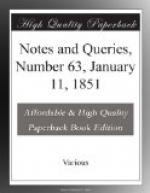IGNOBUS.
* * * * *
REPLIES.
BIBLIOGRAPHICAL QUERIES BY R.G.
(Vol. ii., p. 422.).
Pagnini’s Bible.—I have before me a 12mo. copy of Liber Psalmorum Davidis. Tralatio Duplex Vetus et Nova. It contains also the Songs of Moses, Deborah, etc., with annotations. In the title-page, the new translation is said to be that of Pagnini. It was printed by Robert Stephens, and is dated on the title-page “1556,” and in the colophon “1557, cal. Jan.”
In this edition, both the old and new versions have the verses distinguished by cyphers (numerals). I have not the means of knowing whether, in the earlier editions of Pagnini’s Bible, the verses are so distinguished; but I gather from R.G. that they are.
The writer of the article “BIBLE” in Rees’s Cyclopaedia, says that R. Stephens reprinted Pagnini’s Bible in folio, with the Vulgate, in 1557. And it appears, from my copy of the Psalms of David, that he also printed that part of Pagnini’s Bible in 12mo. in the same year, 1557—the colophon probably containing the correct date.
Your pages have recommended that communications should be made of MS. notes and remarks found in fly-leaves, margins, etc. of printed books; and the above is written, partly in confirmation of Pagnini’s title to the honour of distinguishing the verses of the Bible with cyphers, as suggested by R.G., but chiefly to note that there is written with a pen, in my copy, the word “Vetus” over the column which contains the old, or Vulgate, and the words “Pagnini sive Ariae Montani” over the column containing the new version of the first psalm.
The writer in Rees’s Cyclopaedia, above referred to, says, that “in the number of Latin Bibles is also usually ranked the version of the same Pagninus, corrected, or rather rendered literal by {25} Arias Montanus.” But in the title-page of my copy Montanus is not mentioned.
My copy belonged to Jo. Sheldrake (who was he?) in 1663; to D. Hughes, of Queen’s College, Cambridge, in 1761; and to E. Tymewell Bridges (as the family name was then spelled) in 1777. The latter was a brother of the late Sir S. Egerton Br_y_dges. But the MS. note above mentioned does not seem to be in the handwriting of either of them.
Will some learned reader of your work let me know whether there be any, and what ground for attributing the new translation, as it stands in this volume, to Montanus; or as Pagnini’s corrected by Montanus?
P.H.F.
* * * * *
THE FROZEN HORN.
(Vol. ii., p. 262.)
The quotation from Heylin is good; “the amusing anecdote from Munchausen” may be better; but the personal testimony of Sir John Mandeville is best of all, and, if I am not mistaken, as true a traveller’s lie as ever was told. Many years ago I met with an extract from his antiquated volume, of which, having preserved no copy, I cannot give the admirable verbiage of the fourteenth century, but must submit for it the following tame translation in the flat English of our degenerate days.




